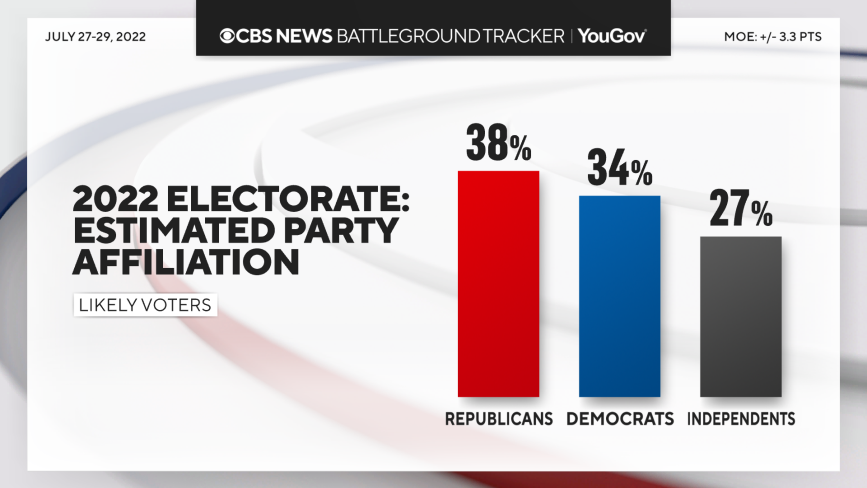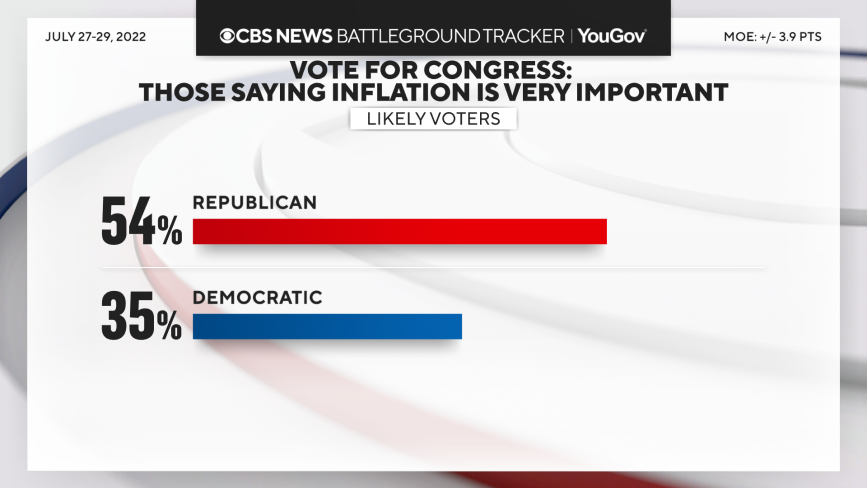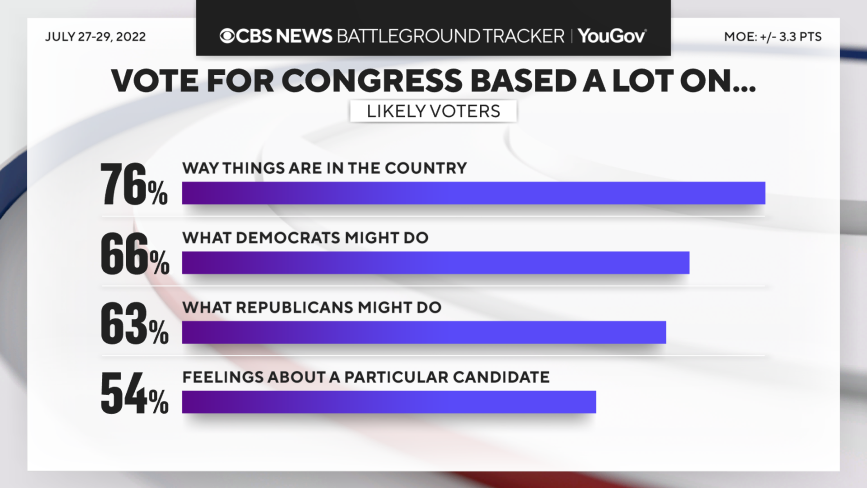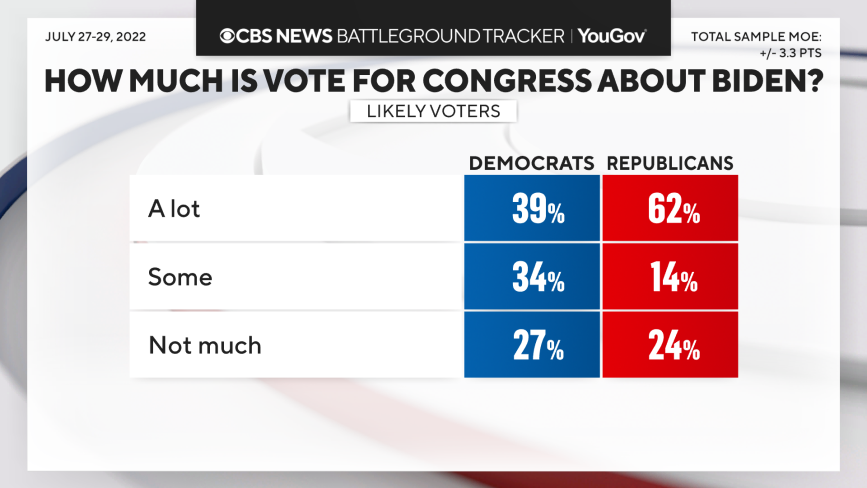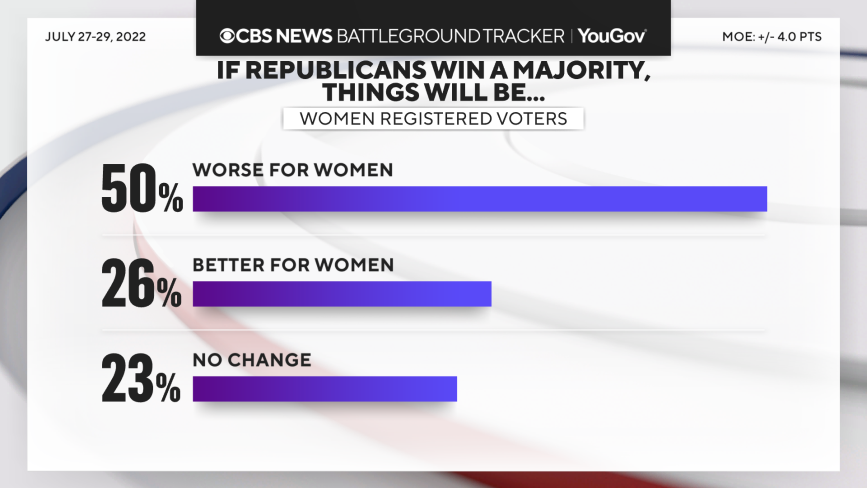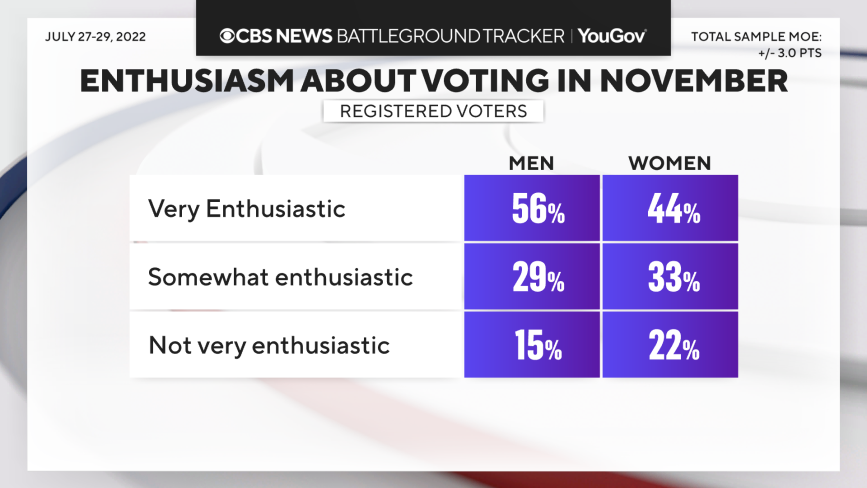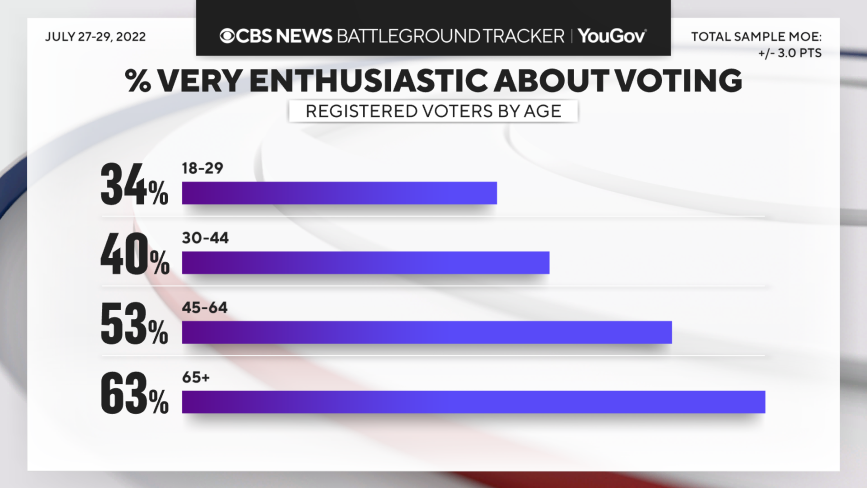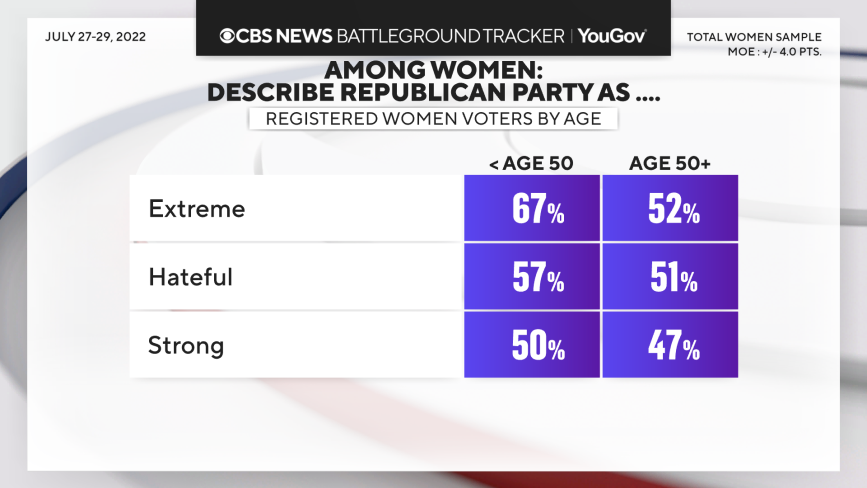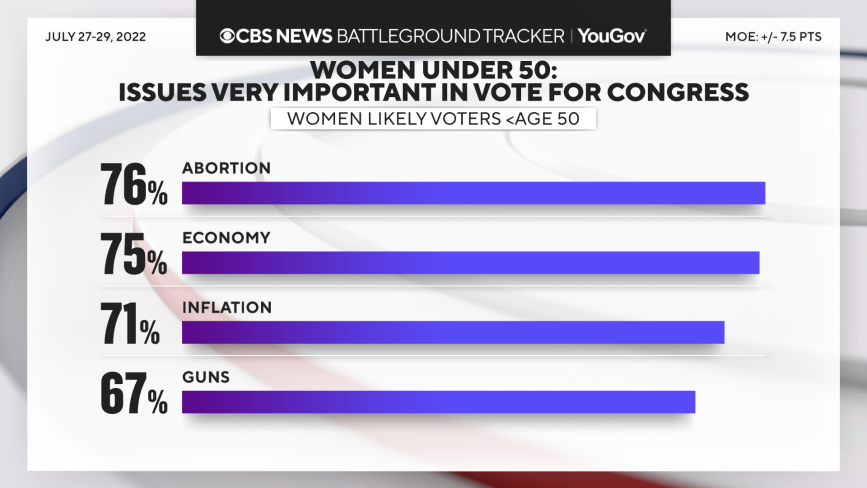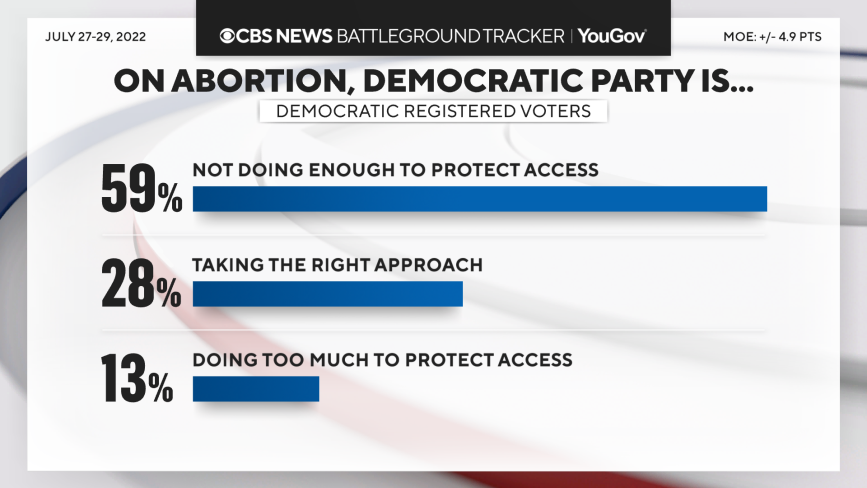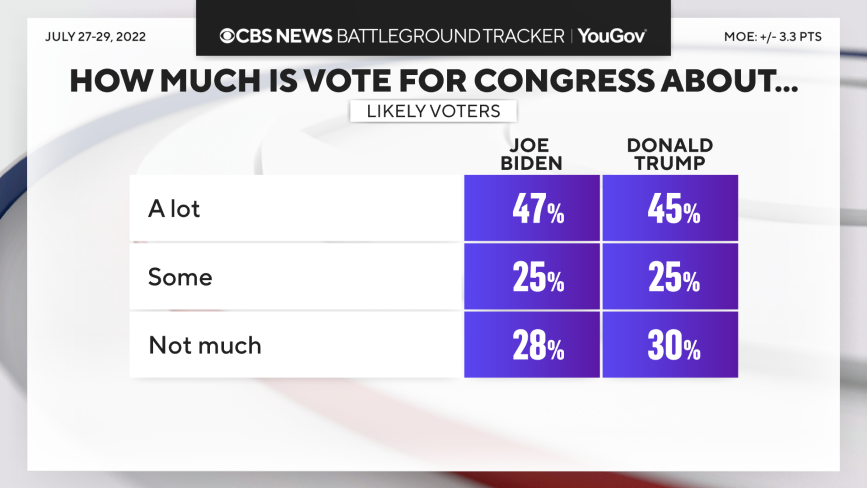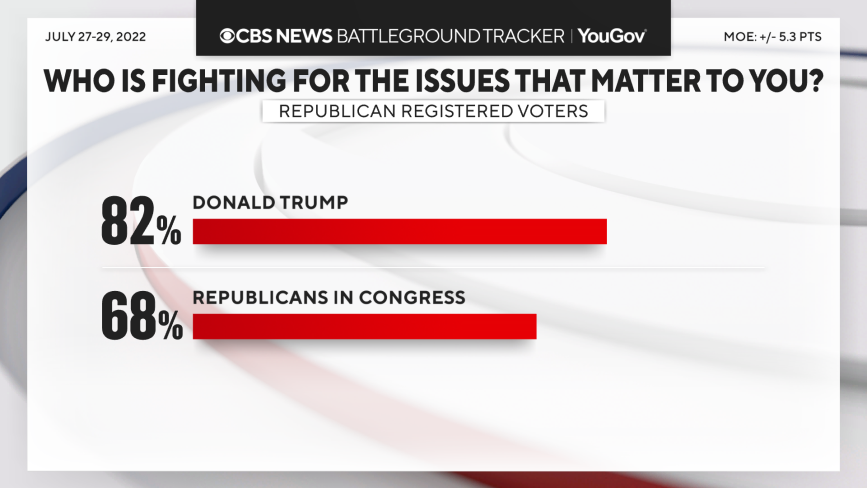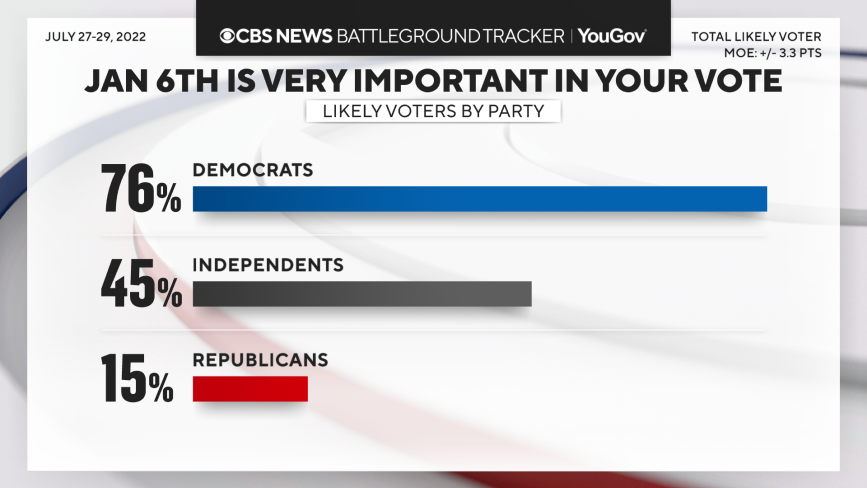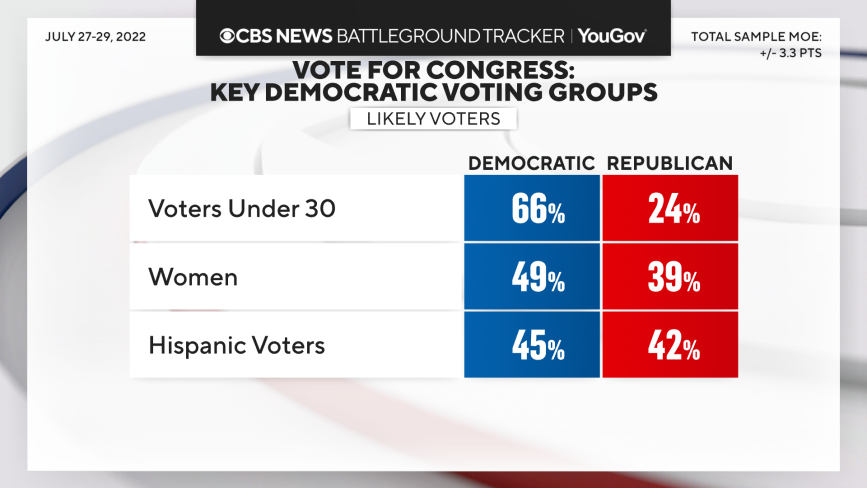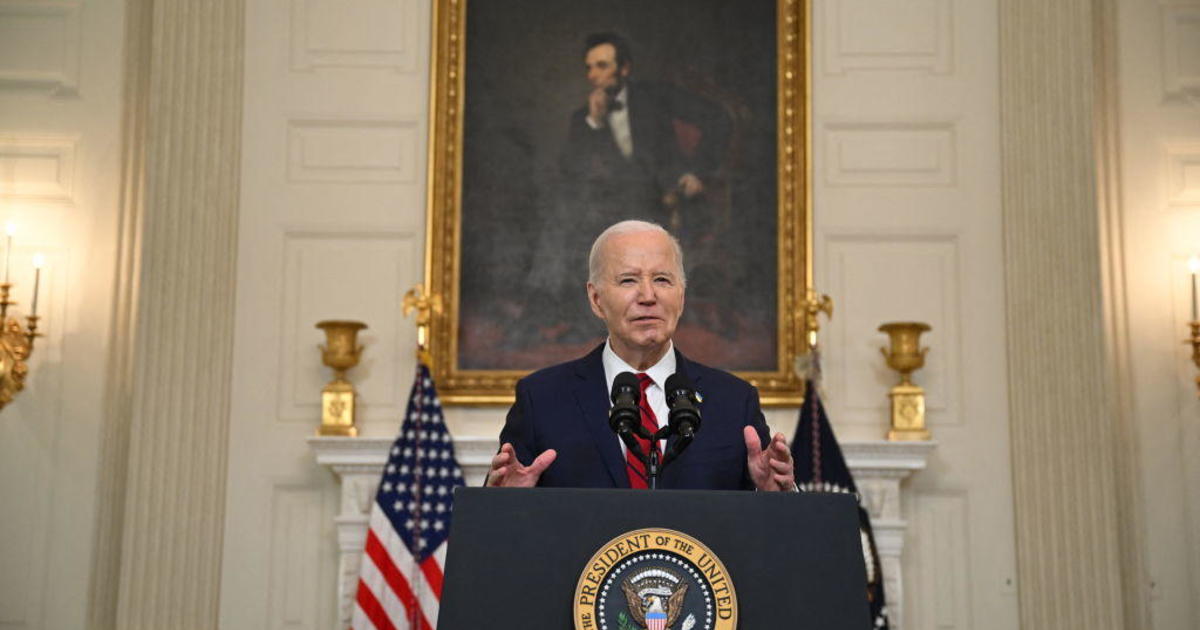Republicans lead race for House control at start of 2022 campaign — CBS News Battleground Tracker
The CBS News Battleground Tracker model finds Republicans start the 2022 campaign with a lead in the race for the House, with 230 seats to 205 seats for Democrats. The party with 218 seats controls the House.
Control of Congress is won and lost in districts, of course, so to bring you this estimate we've surveyed tens of thousands of voters across them all, and connected their current preferences to the 2020 Census, district data and millions of voter records to estimate seat counts. That makes it a picture of things today, not a forecast; it's July, not November.
Our accompanying survey this week gives insights into why things stand as they do, including whether the conditions for a wave could emerge — because there isn't one now — and on the flip side, some real warning signs for the GOP.
The Big Picture: Why the GOP leads
1) It's a "nature of the times" election right now.
Voters' top decision criteria right now is "the way things are in the country" and that's lousy news for Democrats, as the party in power. Republicans are up 16 points among those saying they're basing their vote a lot on it. Those saying things are going very badly break heavily Republican.
2) Key parts of the Democratic coalition might sit this year out.
Like typical midterm electorates, this one is shaping up to be older and more conservative than the country as a whole. Our likely voter estimates indicate that as of now there are more 2020 Trump voters than Biden voters planning to vote this year, an obvious reversal from the last general election.
When Democrats took control of the House in 2018, the party affiliation of the electorate was four points more Democrat than Republican. Our estimates today show the opposite pattern: Republicans outpace Democrats by four points. So it's just a more Republican-looking electorate overall.
3) The districts themselves.
The House consists of mostly safe seats that would survive even a wave election were one to emerge, and nothing in our model suggests otherwise. But between the geographic distribution of voters and the redistricting process and gerrymandering, Republicans get a lot of bang for their buck in translating even relatively small vote shifts into seat flips.
What's the impact of inflation and the economy?
It's giving the GOP some votes and may depress Democratic turnout.
Republicans are leading among those who say inflation is "very important" in their vote, as well as those feeling "a lot" of impact from higher food and gas prices.
In the last midterm elections, in 2018, the party out of power (then, the Democrats) also won the votes of those who said the economy was bad. The trouble for Democrats now is that far more voters today say the economy is bad — and this time Democrats are in power.
Independents who cite economy and inflation as top concerns plan to vote for a Republican this fall. Independents who say the economy is bad break Republican.
Many Democratic voters share sour views of the economy, too, and while it is not making them abandon the party, it may make some stay home: Democrats who are feeling the impacts of higher food and gas prices are less enthusiastic about voting and less likely to say they'll turn out. Democrats who say the economy is bad are less enthusiastic about voting than those who think the economy is good.
What's the Biden factor?
Forty-seven percent of voters say how they feel about President Biden is driving a lot of their midterm calculus.
The Biden effect looks net-negative: those weighing him "a lot" in their midterm vote are breaking Republican by two to one — maybe not a surprise given his low approval ratings.
That's driven largely by Republicans, two-thirds of whom still don't consider Mr. Biden the legitimate 2020 winner. Their negative views of him are motivating them, and they're far more likely than Democrats to say their vote is based "a lot" on how they feel about him.
Only 4 in 10 Democrats say their vote is based a lot on their feelings about Mr. Biden, and those who do are no likelier to be voting Democratic this year than other Democrats.
What about the women's vote?
Women have at best a mixed set of descriptions for Democrats right now, but use a lot of negative descriptions for Republicans.
Women are more likely to call Democrats than Republicans caring and reasonable — but also give the Republicans an edge on being effective, and half of women call Democrats weak.
But most women call the GOP extreme.
And another of Republicans' challenges with women: by two to one, women say a Republican Congress would make things worse rather than better for women.
That includes 6 in 10 women with college degrees.
And yet, in the 2018 midterms Democrats won women by 19 points; today that's cut in half. They won White women with college degrees by a whopping 20 points; today, their lead among the latter is just six. There are a double-digit number of undecideds in this group, setting them up to be a key group to watch over the next months.
Why? The direction of the country, which they think is bad, much more so than how they feel about Biden.
So, will they switch or just sit out? There's a gender gap on enthusiasm: women are less likely than men to say they're very enthusiastic about voting, by double digits.
In all, this looks like a key factor in 2022, just as in the last midterm.
Younger voters and turnout: a problem for Democrats?
Younger voters are the most supportive of Democrats — and the least likely to turn out.
While 2018 set a record for youth turnout in midterm elections, 2022 so far looks to be a return to normal, lower patterns. Just a third of registered voters under 30 feel very enthusiastic about voting this year, lower than their older counterparts. And they constitute the least likely age group to say they'll definitely vote this year. Add to that a modest Republican turnout advantage even among older voters and it becomes clear why Democrats are trailing.
What about overturning Roe v. Wade?
To women under 50, abortion is just as important an issue as the economy and inflation.
Two-thirds of women under 50 describe the Republican Party as "extreme," the descriptor they most often selected to use for the GOP.
But the Democrats may not have all the answers for them, either: most of them think Democrats are not doing enough to protect abortion rights.
Are Democrats disappointed in Biden?
Republicans are more unified in their disapproval of Mr. Biden than Democrats are in their approval of him.
There are one in five Democrats who disapprove of Mr. Biden — and they are staying home in higher numbers than other Democrats. Most of them don't think Mr. Biden has been progressive enough, and don't think he's fighting for issues that matter to them. They're not switching votes, but they're about 20 points less likely to vote this year than those Democrats who approve of Mr. Biden. They are also far less enthusiastic.
The issue of abortion may be one area of disappointment for some Democrats. It's an issue that's very important to three in four Democrats and most of them don't think the party is doing enough to protect access to abortion. Republicans, most of whom support the overturning of Roe, think their party is taking the right approach restricting abortion access.
The Trump factor: no longer in the White House, but still on voters' minds…
He left office two years ago, but Donald Trump ranks essentially the same in voters' calculus as does Mr. Biden. In fact, Democrats are more likely to cite Trump than Mr. Biden as a factor in their vote.
Trump still matters to those in his own party. More Republicans feel he is fighting for the issues that matter to them than say their own party in Congress is.
But in the wider electorate, Trump is a net-negative for the GOP in overall vote choice: those who are basing their vote "a lot" on him are leaning Democratic by five points.
And his impact might boost turnout on both sides. Among Democrats and Republicans alike, those basing their vote on Trump express more enthusiasm to vote than those for whom he isn't a factor.
Next consider two parts of the Republican Party: the 52% who consider themselves "MAGA" Republicans, and the smaller group who don't or don't even know what that is.
MAGA Republicans see the Democrats as enemies, not opposition. And they're voting more to stop Democrats than because they want Republican policies, more so than in the non-MAGA group.
The MAGA Republicans are much more enthusiastic about voting than the non-MAGA GOP.
Is it enough for Republicans to just not be Democrats right now?
Probably not, but there's still a lot of negative partisanship here: half of everyone voting Republican is doing so mainly to stop the Democrats from their goals, more so than because they want what Republicans are offering.
What about Jan. 6?
Right now, Jan. 6, 2021, is a big deal with the Democratic base, who are already voting Democratic. Three in four of them say it will be very important in their vote, on par with other issues.
The question is whether it continues to press the Republicans' descriptors of "extreme."
Republicans aren't paying as much attention to the hearings. But for those who are, they might have a marginal impact on vote beyond that. The Republicans paying at least some attention are more apt to call their own party "extreme" than those who aren't, and we see a slight amount of potential vote switching or consideration among them — still in the single digits, yet more than the Republicans who aren't paying attention.
What to watch: Can Democrats stem their losses? Can Republicans increase their gains?
Turnout looks like a bigger potential factor than persuasion, but both are in play to some degree.
Most voters are all but decided already.
Moreover the amount of partisan "crossover" is incredibly small, a product of our polarized environment. Only 3% of partisans are crossing lines right now. Long gone is the era of weak party attachments, when sometimes a quarter crossed lines. It's also why you see the campaigns pouring resources into base turnout.
Nine percent of each party's current voters would consider a candidate from the other party — a lower rate than we saw across battleground districts in 2018.
One key group to watch is White women with a college degree. They went big for Democrats in 2018, but 12% of them are undecided in their vote choice right now.
And Democrats have some work to do shoring up support from Hispanic voters, whom they've won in the past. Hispanics have been tepid in their approval of Mr. Biden in our polling over the last year, and this poll in turn shows Democrats ahead with Hispanic voters by a smaller margin compared to recent elections.
One reason: the economy and inflation factor into their vote even more for them than for voters overall. (And that's a high bar considering how important the economy is overall.)
Democrats won Hispanic voters easily in the last midterm elections, and this will be another key factor worth watching, especially across a string of competitive districts in the South and West.
Mr. Biden has slipped in approval with Black voters, but Black voters overwhelmingly believe a Republican House majority would make things worse for Black Americans, specifically. Hispanic voters are more apt to think a Republican House would make things worse than better for Hispanic Americans and better for White Americans. The percentage of Black voters currently backing Republicans isn't any different from the last midterm elections (just under 1 in 10).
This CBS News/YouGov Battleground Tracker survey was conducted with a nationally representative sample of 1,743 registered voters interviewed between July 27-29, 2022. The sample was weighted according to gender, age, race, and education based on the U.S. Census American Community Survey and Current Population Survey, as well as to 2020 presidential vote. The margin of error is ± 3.0 points. The House seats estimates are based on a multilevel regression and post-stratification model incorporating voter responses to this survey. Each party's seat estimate has a margin of error of ±12 seats.
